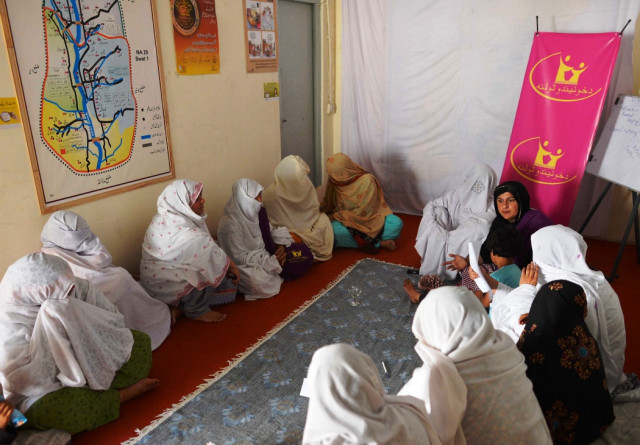Step aside men: Women mediators trained in alternative dispute resolution
Working group chairman says women can better understand the issues of another.

When it comes to dispute resolution in Khyber-Pakhtunkhwa (K-P), women are mostly left out as men make the decisions at jirgas. However, in what appears to be a first, as many as 21 women from Peshawar are being trained as mediators under the government’s alternate disputes resolution (ADR) programme.
These women are being trained along with 104 men and will be a part of local ADR jirgas which will settle minor conflicts in their respective areas. An all-women jirga is already functioning in Swat, however, this is the first time that women will be mediating alongside men.
“The training sessions are being held to enhance women mediators’ capacity to resolve disputes brought to jirgas at the union council and village level,” ADR working group Chairman Muntazir Khan told The Express Tribune. He said the mediators would be especially trained to deal with matters related to women.
Keeping cultural customs in mind, it was important to have female mediators because they would naturally understand issues of women better than men, said Khan.
According to Khan, women from Gulbahar, Faqirabad and University Town would be trained in the first phase and the final number of jirga members would be finalised after the draft bill of the ADR programme was vetted.
Gender-sensitive decision-making
The women mediators themselves were satisfied with the training process, saying it would allow them to settle matters in accordance with the law and ensure basic human rights. “A woman has a better understanding of resolving the issues of another woman,” said one of the trainees.
Sakina Rehman, who hails from Faqirabad, said she enjoyed the complete support of her family to join a jirga in this male-dominated society.
“Although I am part of a jirga which deals with matters related to both genders, women are mostly involved in a majority of disputes in our society,” Rehman said. She added the ADR council she is associated with usually deals with matters related to domestic disputes, such as rows with in-laws.
Another female mediator said the government’s awareness campaigns have been fruitful and people were bringing their disputes to ADR jirgas rather than filing cases at police stations and courts. “Here, issues are swiftly dealt with and without any cost.”
The training sessions for ADR’s women mediators is being conducted by Aitebar, in collaboration with the Sarhad Rural Support Programme (SRSP) at the Human Resources Development Centre.
The K-P home department has been focusing on providing immediate and cost-free dispute resolution for the people and has introduced the ADR mechanism for the purpose. It was initially launched as a pilot project, but officials said it would be extended to every district of the province.
The department has also conducted trainings for the ADR council members and one such training session concluded on September 24.
One of the segments focused on sensitising trainees to ensure the forums are more gender responsive and human rights compliant. The training also emphasised on maintaining records of disputes brought to jirgas for the sake of transparency.
“There is a considerable population of tribal people in Khyber-Pakhtunkhwa who do not access the formal justice system,” Muntazir Khan had said on the occasion. “They want swift settlements in accordance with their local customs and norms.”
Khan was also of the view that dispute resolution through jirgas would lighten the burden on civil courts by more than 50%.
Published in The Express Tribune, October 4th, 2014.













COMMENTS
Comments are moderated and generally will be posted if they are on-topic and not abusive.
For more information, please see our Comments FAQ